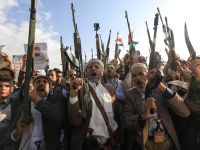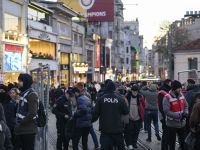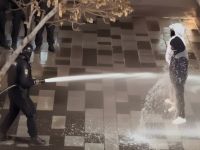While Lebanon hails its victory in a qualifying football match as a sign of otpimism and national unity, explosions shake the southern port city of Tyre and raise questions on the UN targets. Two reports from Lebanon's Daily Star.
The news out of Lebanon in recent weeks and months has featured its fair share of political rifts and sectarian rhetoric, but two events have shone through despite all of the depressing news items and media commotions.
The campaign to see Jeita Grotto as one of the New Seven Wonders of the world was one such break in the gloom and doom, even though it ended unsuccessfully last week. This week, Lebanon’s 2-1 victory over South Korea in World Cup qualifying was another such event, the kind of rare occurrence in which people forget what part of Lebanon they’re from, what sect they’re from, and whatever other non-national group they cling to.
Around 40,000 people packed the Camille Chamoun stadium for a thrilling match that united Lebanese in mass tension – the good kind, though – as the minutes of the second half ticked away and people hoped the national team could hang on for a victory.
The celebrations in the street had a single, unifying emblem, the national flag, in sharp contrast to the usual type of partisan or sectarian gatherings that might divide people further instead of bringing them together.
Tuesday’s football achievement in Beirut highlights an important area in which government officials need to do much more. They should remember the enthusiasm, and the reactions by the public to a fine national team performance, and ask themselves if they’re really spending enough money and effort on promoting the country’s various national sports.
There is a fairly well-developed system of private clubs when it comes to football, but many of these are the result of individual initiatives, and are linked to certain political groupings. But every country has the option of developing its national teams, when club allegiances and everything else is forgotten, except the honor of representing one’s country in international competition.
Increasing the Sports Ministry’s budget and ensuring that the money is spent wisely and effectively have been huge challenges for post-war governments, which at the same time have witnessed impressive achievements in sports, mainly on the basketball front. Football is the other main “national pastime,” but the imbalance between the efforts that go into clubs versus the national team has been disappointing, and should change.
Sports should be given the right kind of attention and strong national programs should be established in various types of competitions. Politicians from across the spectrum spend their time saying they want to build strong national institutions, and this is one area in which they can be urged to follow through on their rhetoric.
When the team’s performance is deserving of praise, win or lose, it can go a long way to bringing people together, as evidenced by Tuesday’s enthusiastic crowds and television audience. The players, coach and everyone involved had a single goal – doing something good for Lebanon, with no other motives coming into play.
Two explosions rock Tyre
Two near-simultaneous explosions shook the southern port city of Tyre early Wednesday, including one at a hotel frequented by U.N. peacekeepers. No casualties were reported.
The first explosion at 4:55 a.m. ripped through a restaurant at Queen Elissa Hotel, damaging several cars, including one belonging to a U.N. officer who works for the United Nations Truce Supervision Organization (UNTSO).
A similar explosion tore through a liquor store near the port of Tyre five minutes later, inflicting material damage.
Lebanese security forces cordoned off the area around the Queen Elissa Hotel, preventing reporters and photographers from getting close to the site.
The bomb destroyed the ground floor restaurant at the three-story hotel and shattered windows.








